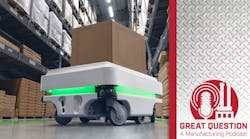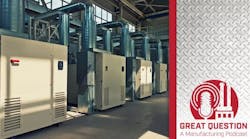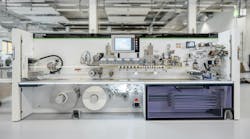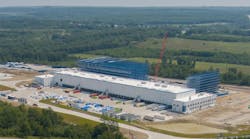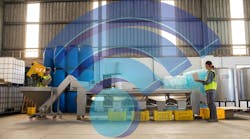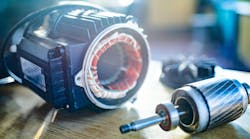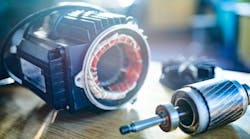With the financial strength of The Carlyle Group behind it, Firth Rixson Limited is a company on the move. The latest move was revealed on July 26, 2004 when the company announced that it was working on two projects that will give it a production presence in China.
The project furthest along involves building a 50,000 ft2 facility near Shanghai to forge and process seamless alloy rings for aerospace applications. Named Firth Rixson Aerospace Components Co. Ltd., a wholly owned manufacturing facility, it will focus on supplying aerospace customers in China, the surrounding region and eventually supplying customers around the world. Groundbreaking for the facility is scheduled for late August.
According to Armand F. Lauzon, Jr., CEO of Firth Rixson, "Our second joint venture is an agreement with a Chinese manufacturing company. This venture will call for the two parties to operate a heat-treatment and machining facility, near Guiyang, China. This new facility would be designed to meet the most modern aerospace quality requirements and service product up to - and exceeding - current market demand for large sizes."
In the joint venture, Firth Rixson will supply Forged pre-forms that will be processed on the Chinese manufacturer’s seamless-ring mill. "We will also provide technical consulting and systems to support heat treatment and finish machining of the rings our joint venture partner produces," Lauzon said.
Firth Rixson Limited (www.firthrixson.com) was formed in 2003 by a merger of U.K.-based Firth Rixson and U.S.-based Forged Metals, Inc. FRL is majority owned by The Carlyle Group, a global private equity firm headquartered in Washington, DC. FRL’s U.S. offices are in East Hartford, CT; its U.K. headquarters is in Sheffield, England.
With the two projects in China, FRL will own 14 operating facilities in North America, Europe, and Asia (see map for locations), and employ more than 1,700 worldwide. It serves customers on a global basis in a variety of market sectors such as aerospace, defense, power generation, transportation, petrochemical, medical, and general industrial.
Forging interviewed Alan Erickson, group v.p. - sales and marketing, for some perspective on the evolution of Firth Rixson Limited and on the importance of establishing a presence in China.
Evolution of FRL —Firth Rixson Ltd. was formed in February 2003 when The Carlyle Group brought together two companies: Forged Metals Inc., a family owned business in Fontana, CA, and Firth Rixson PLC, a publicly traded British company. With the Forged Metals acquisition, the Firth Rixson organization had 14 facilities, spread across the U.K., two facilities in the U.S., and another in Hungary.
With the merger, FRL includes ring rolling, closed die forging, casting, and other metals operations. (Did the merger add anything new?)
Erickson explained that "all the operations in the U.S. are ring rolling manufacturing facilities, with plants in Fontana, CA; Reno, NV, and Monroe (Rochester), NY. We also have ring rolling operations at Parkgate and Ickles in the U.K."
FRL has three die forging facilities, located in Derbyshire, Yorkshire, and South Yorkshire in the U.K.
According to Erickson, "We are focusing on upgrading our capabilities at our ring rolling facilities and our closed die forging operations. We’re probably moving faster on the ring rolling side. We have a significant number of ring mills, each one of which has to be supported by ancillary equipment such as manipulators and heating units, as well as presses to form the billets prior to ring rolling. We are looking at all of that equipment to make sure that it is as up to date as it needs to be."
Further improvements are expected from the implementation of new manufacturing strategies. Erickson says, "We picked our Monroe (Rochester, NY) facility as the lead site for our initiatives. The plant specializes in servicing the aerospace bearing market and aero engine OEMs. Our other plants are now following with their initiatives. Combining Monroe’s production with that of our other plants makes Firth Rixson a large supplier of rolled seamless rings for aerospace bearings.
"All of our ring rolling facilities serve primarily aero engine customers, with the exception of the Ickles facility in the U.K., which serves a number of market sectors such as oil, gas, rail and other general industrial applications."
Turbine ring technologies —Forging asked Erickson about the acquisition of Turbine Ring Technologies, a certified aero supplier of the full gamut of flash butt welded rings in the U.K. Acquired in November of 2003 by Firth Rixson, it uses a proprietary vertical stand technology to supply flash butt welded rings, including thin sheet metal configurations to a wide variety of customers.
Why would Firth Rixson be interested? Erickson’s explanation: "For some components a customer will allow its supplier to use either the flash butt welding or seamless ring rolling production route. The flash butt welding process typically offers lower-cost manufacturing than the ring-rolling process.
"Where this can be important for us is when we bid on a package of parts for an aero engine. In these types of packages, there will usually be rotating and non-rotating components. Rotating components are routinely produced using the seamless ring rolling process. But a number of the non-rotating components are obvious candidates for the flash butt welded ring process. For this reason, the TRT acquisition improved our ability to make a package proposal to a customer at the lowest possible cost."
According to Erickson, the TRT operation is being incorporated into the Ickles forging facility.
Why China, now? —"The Asia Pacific region represents an opportune marketplace for us right now. There are two key reasons why," Erickson says.
"First, the market potential in China over the long term is going to be huge. We see China as a very high-potential marketplace and for this reason we want to be the first Western company to establish seamless ring rolling forging capability over there.
"The second reason is that our OEM customers, for example, the major jet engine manufacturers, such as GE, Pratt & Whitney, and Rolls Royce, are encouraging us to invest over there. These OEMs are committed to sourcing their product in China. And they want existing suppliers to start the process for them so they can benefit from the lower-cost opportunity there down the road, knowing that they need Western technology to get the process started.
"Take for example an area such as raw materials. At this time, we don’t have available to us in China aerospace material suppliers that can meet the standards that we have come to expect in the West. So we will have to import material into China to start the process. However, once we get the process started over there, we can finish it. We can process components completely and supply them to OEMs in Mainland China. And of course, we’ll also be able to supply from China in certain configurations and technologies to other parts of the world."
Two Chinese projects —Forging asked Erickson for details on the ring rolling plant, which obviously represents a major commitment.
"Our investment in China represents a significant commitment, both in capital and also in human resources," Erickson agrees. "We are going to put in a team of ex-pats who will reside in China in order to help get that facility up and running. We have selected a manager for that team and he and the other team members will be going over in a few months.
"We have leased property and are starting plant construction in a well-developed industrial park. The park has been in existence for about 10 years and construction now covers about half of the land available." The park, he notes, is operated by a Chinese government agency and interests from Singapore. It follows a model developed for the industrialization of Singapore, when Western companies began ramping up their investments in that country.
Erickson says, "I recently visited our site in the park. It’s very impressive to see how quickly the construction is going there. Our corporate neighbors there are all the companies whose brand names are very well known by all of your readers.
"In fact, the industrial park is a complete community. It has company headquarters, manufacturing plants, residential housing for the workforce, recreational facilities, shopping areas and even an international school for children. It is a fully modern city that has been developed for companies who establish operations there.
"The park has ample supplies of electricity and natural gas, which we will require for our facility," Erickson says. At some point, the FRL facility will be staffed by Chinese nationals. "We will be training some of those people at our ring mill plants in the U.S." Erickson reports.
"All of our customers are extremely interested in what we are doing and excited about the fact that we have made a commitment to do this. They’re asking for updates on a regular basis and want us to move forward as rapidly as possible. We are-and we expect to be in production in about 12 months for some pre-production manufacturing, and in about 18 months we could be near full production.
"The plant will be built with a combination of new equipment sourced in China and equipment that we will import. Of the equipment that will be built in China, some will require that Western technology be added to it. As an example, heat treat furnaces will be built there using Chinese labor and materials, but the controls on those furnaces will probably come from the U.K. or the U.S.
"We have existing equipment that we intend to ship over there, although we still have to determine the exact size ranges and the supporting equipment that will be needed. Any existing equipment that we use will be refurbished while the site is being prepared.
Business conditions —According to Alan Erickson, "So far in 2004, business is stronger than we expected. We saw a surge in requirements in the early part of the year, a lot of it driven by the military restocking spares because of the conflict in Iraq. In addition, we have seen an up tick in orders from OEMs that are replacing depleted inventories. During the last couple of years, customers tightened inventories. However, demand has increased and our customers have found the need to replenish their stocks and maybe even adding buffers for surge requirements.
"About 60% of our business is aerospace and we’ve seen improvement in some areas of this market segment, but not across the board. For example, sales of single-aisle, narrow-body aircraft engines are rising. The Boeing 737 and Airbus A319-A320 aircraft are selling better now. However, wide-body aircraft are lagging behind. The outlook for wide-body aircraft should get better as Asian economies improve, because increased passenger traffic is going to raise demand for wide-body aircraft.
"We’re seeing a positive impact on the industrial-commercial side of our business, because we’re quite diverse in segments other than aerospace. The general improvements in the global economy have sales trending in the right direction," Erickson concludes.
